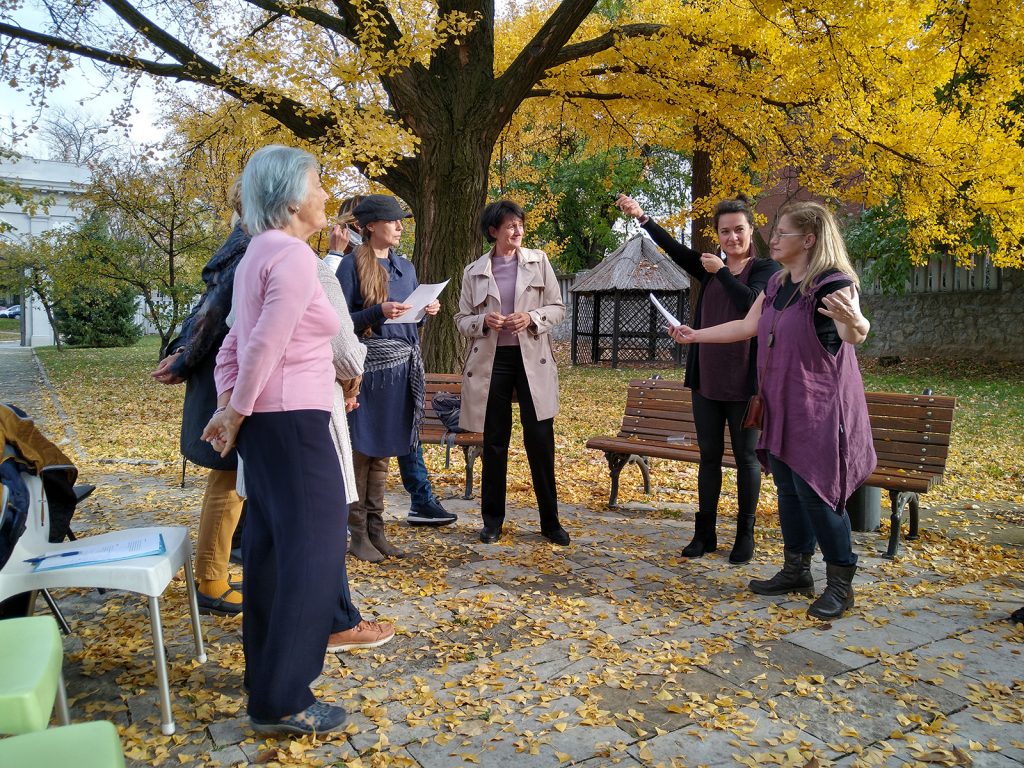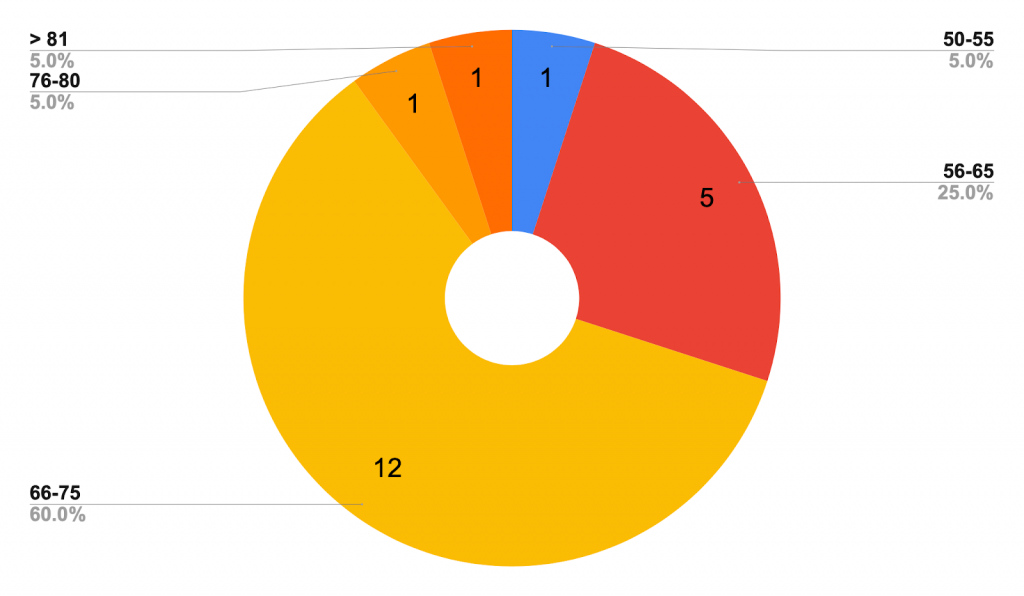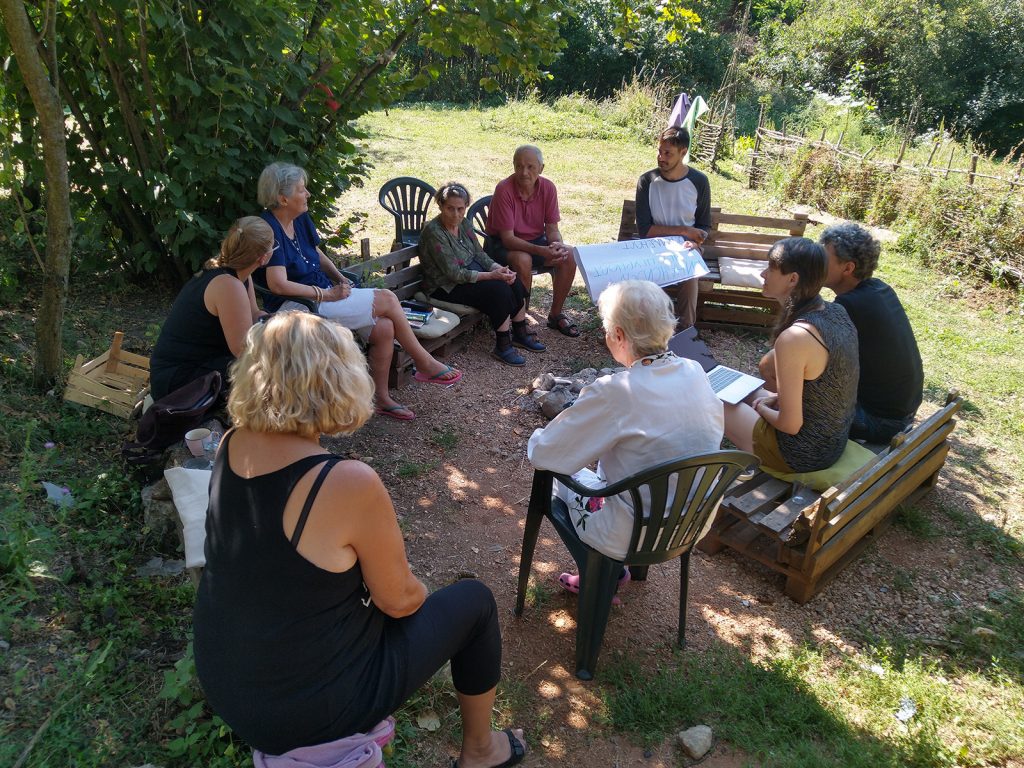Why a law on cooperative housing is needed (in Slovenia)?
Author: Rok Ramšak, Zadrugator / IŠSP, Ljubljana
While housing cooperatives are widely recognized as highly effective and successful model of housing provision, and have a century long tradition in some of the more “developed” parts of Europe such as in Austria or Switzerland, one would have immense problems finding any examples in post-transitional countries of Central and Southeast Europe (CSEE), such as Slovenia. Why is that so?
Many people would have the tendency to point out historical factors and economic differences. Politicians especially often resort to insightful surface-level explanations based on cultural differences. In case of Slovenia, it is difficult to find a politician that is not convinced that “Slovenians have housing ownership written in our DNA,” and have an “innate dislike of any kind of rental housing models.” It is likely not that much different in other regional countries, despite research proving otherwise.
If you were to pose that same question “why are there no housing cooperatives in CSEE” to one of the increasingly numerous housing cooperative initiatives, the answer, coming from actual experience, would tend to move in the direction of economic factors (such as limited availability to financial resources) and national legal and regulatory frameworks. While you can read more on the lack of adequate financial actors, instruments and investments in a recent study conducted by the MOBA Housing cooperative, the following text will focus on the legal and regulatory frameworks. Particularly, we will take a look at the limitations that the housing cooperatives in Slovenia are facing and how the Zadrugator Cooperative and the Institute for Studies of Housing and Space tried to address this by developing a Proposal for a Regulatory Framework on Housing Cooperatives. By looking at proposed regulatory areas of intervention, we will also try to understand why this is important – both for housing cooperatives as well as for assurance and protection of long-term public interest.
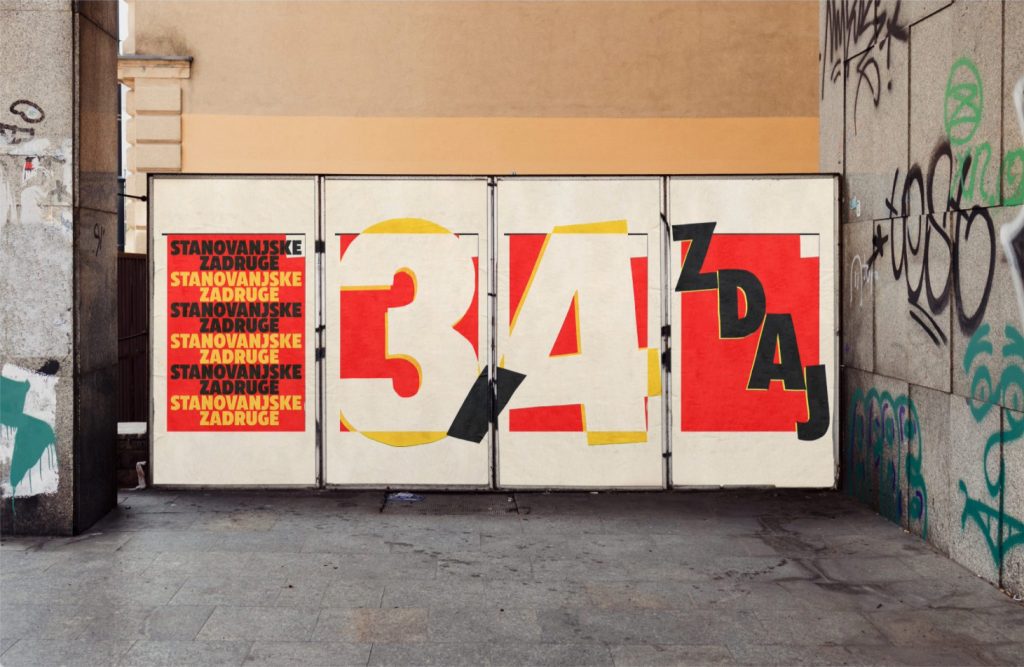
What are housing cooperatives and what makes them so great?
Housing cooperatives are a form of collective housing ownership and management where residents jointly own and govern the property they live in. The residents are also members of the cooperative, each generally owning at least one share of the cooperative as a legal organization. Being truly democratic organizations, each member, no matter their number of shares or the size of their investment, will always have only one vote. And let the vote part not confuse you. Despite always having well defined and transparent voting and decision-making models and regulations, majority of cooperatives strive to make decisions through consensus.
While cooperatives are extremely diverse in nature, and there is almost as many types of housing cooperatives as there are housing cooperatives, the basic foundation of any cooperative is the recognition by individuals that they can more easily or successfully address their needs through cooperation. In order for housing cooperatives to realize their mission, they develop all the necessary housing provision activities that strengthen the well-being of its members and the wider community.
One of the most successful housing cooperative models – by criteria of assuring long-term affordable housing, is the rental cooperative. In the rental model, the residents are all members of the housing cooperative and thus own a part of the cooperative and consequently the building, but they do not own the apartment in which they reside. So instead of owning the apartment, they rent it based on the so-called cost-based rent. The rent is determined based on the actual cost of designing, constructing, financing, and maintaining the cooperative. By excluding any private profit from the rent, you make the rent more affordable compared to market-based rent and, through time, while market rents always increase, the cost-based rent remains relatively stable in fact becoming increasingly affordable over time.
Another mechanism that housing cooperatives utilize, particularly rental cooperatives, in order to assure long-term affordability, is leasehold of the land. Instead of purchasing the land, it is much better for a cooperative to negotiate favourable terms from a public partner – i.e., a municipality, gaining long-term leasehold for a favourable price. While land ownership has tremendous financial benefits for a private investor, the leasehold model reduces the initial investment volume and reduces the financial burden for the rent.
The leasehold is, on the other hand, a very powerful mechanism, that assures the long-term public interest. It assures long-term affordability of housing that receives public support by preventing speculation. Unlike with ownership models, if the housing cooperative members would have a change of heart, they could not simply transform the cooperative into a for-profit organization or sell the land or the housing for a profit. This assures that the cooperative apartments remain homes rather than turning in vehicles for investment or profit.
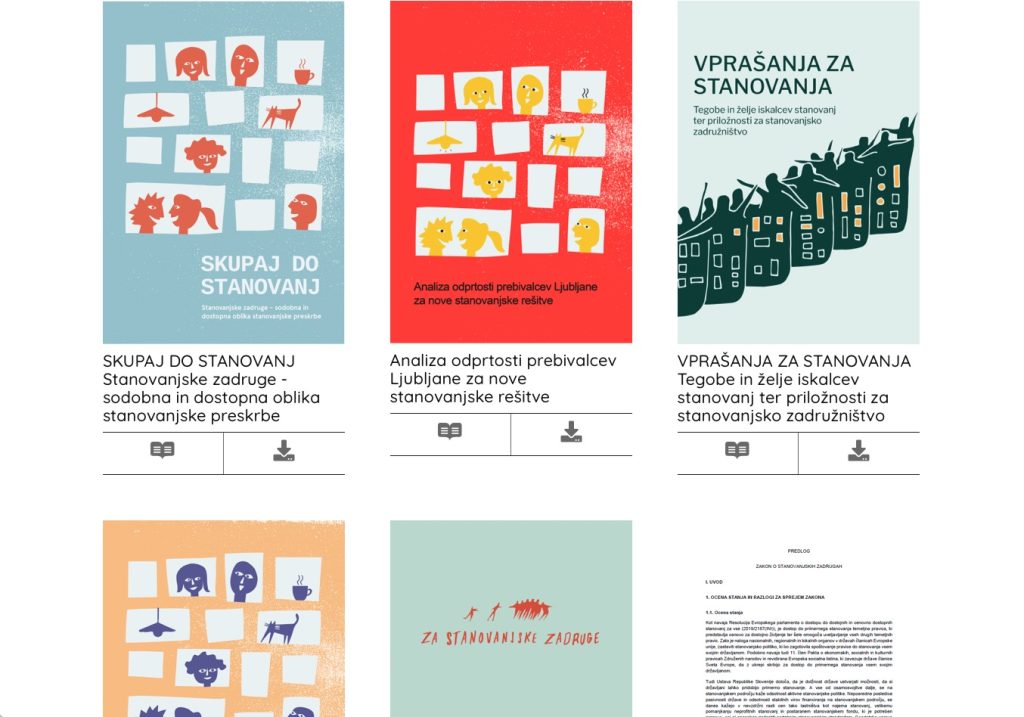
Why is legislation regulating housing cooperatives needed?
Although Slovenia has a general law on cooperatives (ZZad), as well as a Housing Law (SZ-1E) that oversees housing provision, including public housing, these regulations do not specifically address or facilitate the establishment of housing cooperatives. The biggest challenges in the current situation for the development of housing cooperatives are access to land, and long-term, affordable financing – loans.
Even though housing cooperatives would be operating in a non-profit setup and provide cost-based rental apartments, urgently needed in Slovenia, according to the current legislation, housing cooperatives are not able to acquire leasehold for land on which the housing cooperative could be built, for anything below market price. This means the Cooperative if forced to compete with speculative market actors – an impossible task, especially in urban environments where the cost of the land represents a much higher share of the investment – in Ljubljana at around 25%.
To promote affordable housing through housing cooperatives, a group of NGO’s in Slovenia drafted a comprehensive proposal for the Law on Cooperative Housing, covering development, operations, management, public support mechanisms, regulation of access, and protection against commodification and speculation. The following chapters address these various aspects of the proposal.
VIDEO: Public and political support?
Definition of a Housing Cooperative
The proposal defines a housing cooperative as a cooperative established with the main purpose of providing permanently affordable and quality rental apartments to its members through renting, buying or construction of housing. It can also pursue other activities that are in members’ or public’ interest and encourage solidarity, cooperation and build capacities to solve social, economic, environmental and other societal problems. Rental cooperative housing as defined in the proposal is in public interest and therefore entitled to public benefits.
Rules of operation
Members of housing cooperatives can be physical persons and legal persons, but only if they are organised as a housing cooperative, a public housing fund, a non-profit housing organisation, or a non-profit association, institute or social enterprise. For the establishment of a housing cooperative the minimum number of persons is five, among which less than 50% can be legal persons.
Cooperative members may use apartments only for their own use and cannot sublease it unless several conditions are met, such as subleasing only for a short period and the length of the sublease not exceeding 12 months in a 5-year period. The member needs to submit a formal request and receive approval by the management board.
The housing cooperatives cannot distribute any profits among their members, and can only use it for its operations and for: investment in its capital assets that are necessary for its operations, labour costs, coverage of losses from unpaid rents, education and training of workers and volunteers, and other non-profit activities.
Cost-based rent
Apartments in cooperative housing are let with a cost-based rent, calculated in a way that covers costs of construction, land, financing, insurance, management and maintenance, and costs of income loss from unpaid rents. The purpose of cost-based rent is not and it cannot be the creation of profit for the cooperative.
Cost-based rent is independent of market-based housing prices. Cooperatives have the right to adjust the cost-based rent with the inflation index or the index of salaries growth, or each time with the lowest of the two indexes, as they decide and define in their Cooperative Rules.
Cooperatives can decide on the extra payments above cost-based rent, through which they collect resources for its reserves, solidarity, development or other purpose-made funds. The level of extra-payment can differ among members, but it cannot exceed 50% of the cost-based rent.
Since in Slovenia non-profit organisations are required to pay corporate taxes, exemption of housing cooperative income from rents is proposed to be exempt from taxation.
Initial contribution by members and financing
A housing cooperative member needs to provide an initial contribution, which has to be at least 5% of the housing investment cost. Initial contribution by members could be higher and it is not required to be set at the same level for all members. In case of moving out, the initial contribution has to be refunded to the member at least in its nominal value.
The rest of the required financing for the investment into construction of a cooperative housing is provided by the housing cooperative as a legal person. The later is important as it keeps the burden of any loan repayments from an individual and recognizes it as a collective risk.
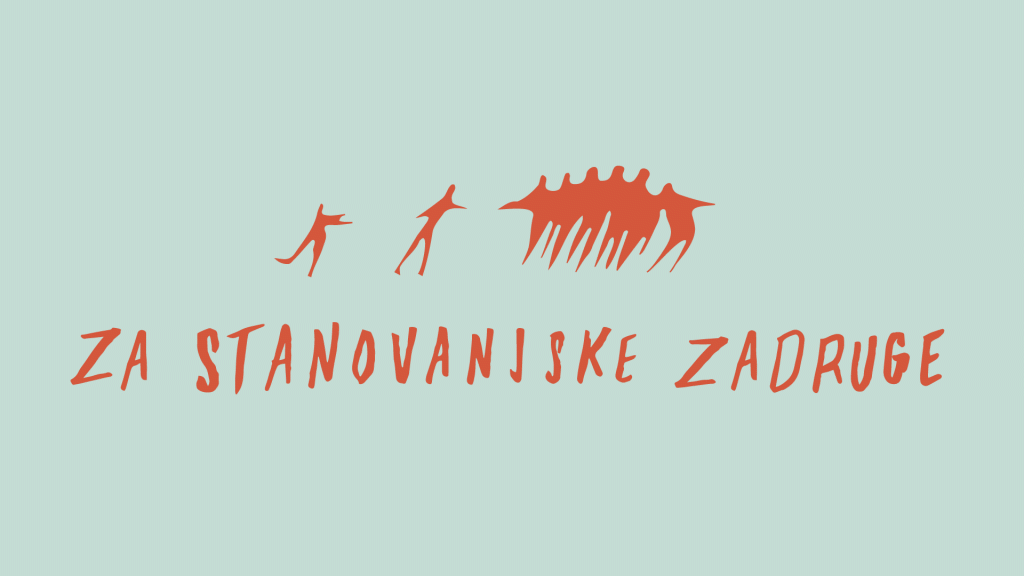
Access to cooperative housing apartments
Members of a housing cooperative can candidate to rent an apartment in a housing cooperative. Membership in a housing cooperative is open. A housing cooperative sets rules for a transparent and democratic process, through which it selects tenants for the available apartments.
To be eligible to rent an apartment, a member needs to fulfil certain criteria connected to the income and property of a household, which should not exceed the set limits. The limits proposed for the income census are the same as for the access to public non-profit housing – e.g. for a one-member households it should not be above 200% of an average net salary, for two-member households it should not be above 250% etc. The property limits are set at asset value not exceeding 40% of market value of suitable housing.
To enable a diverse social mix, a housing cooperative can decide on the exceptions to the above if certain conditions are met – i.e. no more than 20% of residents may exceed the criteria, and those exceeding it, are required to pay higher rent which is used as subsidy for those with lower incomes.
Mechanisms in support of cooperative housing
The proposal defines several public support mechanisms for housing cooperatives. These include:
- Improving access to public real estate below market price by reserving land for housing cooperatives, enabling public institutions to transfer the right to build for a housing cooperative under favourable terms or for free, by long-term leasing of public land or housing on more favourable terms.
- Tax exemptions for all income generated by housing cooperatives from cost-based rent.
- Providing access to affordable loans with up to 40 years amortisation periods, providing grants for the promotion of housing cooperatives, and providing bank guarantees to housing cooperatives. The law proposal also provides the possibility of obtaining a mortgage loan on the basis of the acquisition of the right to build and not only on the basis of land ownership.
- Promoting the housing cooperative sector and supporting newly establishing projects by providing expert support and various capacity raising resources.
Mechanism preventing commodification and speculation
The proposal suggests that housing cooperatives, which have received any public benefits, are prohibited from being privatised, sold or transformed into another kind of entity at least until all public benefits have been repaid in full. However, it could preferentially sell its apartments to a public actor which has provided land or any other incentive, or, subsidiarily, to another housing cooperative, public housing fund, or municipality. To sell apartments, a housing cooperative needs 100% agreement among members which can potentially also include public actors, housing funds, or other housing cooperatives.
The public partner has a right of complete oversight of the management of the housing cooperative and can – in case of a breach of contract or of the law – take over the management of the housing cooperative for a limited amount of time, in which the democratic self-management of the cooperative is suspended.
The proposal also defines penalties for cases when the cooperative is breaching the law. For example, when the cooperative is charging a higher than cost-based rent, mismanages operational surplus, etc. In case the cooperative were to sell an apartment, the cooperative and the responsible person would have to pay a fine as well as return the full price plus 10%.
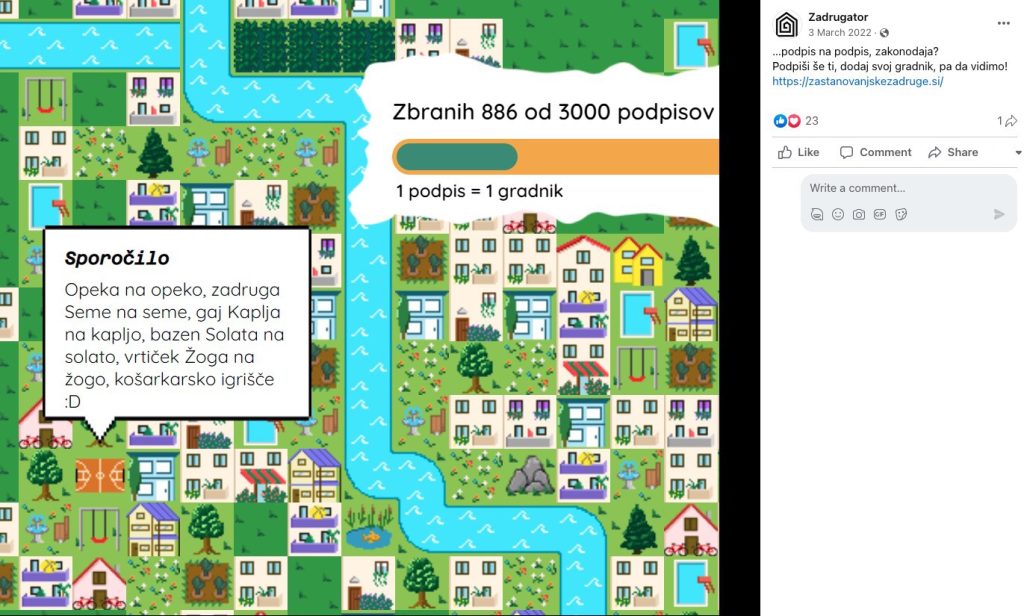
Where next
The outlined regulatory framework for housing cooperatives in Slovenia seeks to create a conducive environment for their development, ensuring the provision of affordable housing while safeguarding the long-term public interest. By addressing existing legal and regulatory limitations, it aims to unlock the potential of housing cooperatives as an effective solution for affordable housing provision. In order to increase the chances of passing a suitable legislation, the regulatory framework was developed in a way to allow it to be formed as an independent Law on Cooperative Housing (lex specialis), or to be integrated into the existing Law on Housing.
When the framework was developed in 2022, it was widely disseminated through social and mainstream media. As 2022 was the parliamentary election year, a strong advocacy campaign was organized which proved to be successful. Majority of parties running for the parliament gave support, including all three parties that ended up winning the election and forming the government. Support to housing cooperatives was also committed in the Coalition Contract.
Interestingly, this was not the first time that Housing Cooperatives ended up in the Coalition Contract, and unfortunately, it is highly likely that, again, they will remain stuck just there as government after government refuses to address the housing issue. In the last couple of years, we have observed a steady trend of governments pushing housing aside, making minute, populist or even negative changes in legislation, or forming legislation that primarily favours the wealthy elites – most often on the expense the public interest.
The first year of the current government has, unfortunately, indicated that all of these three reoccurring scenarios are very likely to unfold once again, which could spell immediate disaster for hundreds of thousands of people and seriously undermine the foundations for any inclusive and sustainable development in the future.
This is why several organizations and individuals from different Slovenian cities have started building up a strong and diverse coalition of experts, non-government organizations, civil society representatives, and various committed individuals in order to be ready to resist any negative change ahead of us, and to proactively form new political opportunities should the existing government forget or stray from the promises that got them elected.
Tekst je nastao kroz saradnju Ko gradi grad i Koalicije za razvoj solidarne ekonomije u okviru projekta „Novo stambeno zadrugarstvo: put do održivog finansiranja“ koji je podržala Fondacija za otvoreno društvo, Srbija.

